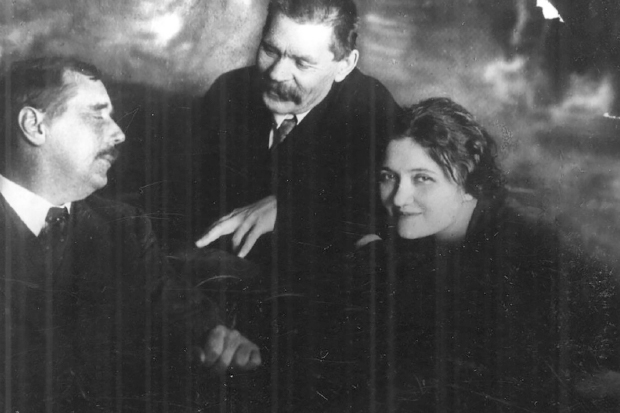Moura Budberg (1892–1974) had an extraordinary life. She was born in the Poltava region of Ukraine, and as a young woman she danced at the Sanssouci Palace at Potsdam with the Russian Tsar and the German Kaiser. In her twenties by 1917, she had a well-placed aristocratic husband, two children and several fine homes in different countries.
This might have been enough for most of us, but for Moura it was merely a preamble — we are only on page 15. Revolution, espionage, embezzlement, murder, executions, plenty of intimacy and arrests by several different nations take us through a few more chapters. She surges on, driven by her twin passions for men and intrigue and, above all, a determination to survive, fully exploiting her considerable brains, charm and languages, and her useful ability to drink men into oblivion ‘without showing more than a slur in her voice’.
As Deborah McDonald and Jeremy Dronfield note with some pleasure, ‘Moura’s life was woven with lovers’, to most of whom she showed no more fidelity than to her spymaster employers. The ten named in this book include Alexander Kerensky, the pre-Lenin Russian revolutionary leader; Yakov Peters, the head of the Moscow Cheka; and the leading agent of the British plotting against the Bolsheviks, Robert Bruce Hamilton Lockhart. Lockhart was the only man Moura fell passionately in love with, and when she writes to him hoping he will ‘soon see the red sweater again’, it is pleasingly ambiguous as to whether she is teasingly referring to her clothes or her person.
Few women can boast such political reach, aside perhaps from Magda Goebbels and Edwina Mountbatten. But Moura was not finished. Later lovers included the great Maxim Gorky, who on meeting her reportedly set out his thoughts to impress her, ‘like a peacock spreading his beautiful feathers’. And Gorky introduced her to a visiting H.G. Wells, whom she quickly seduced and slowly came to care for, acquiring a British visa on the way.
With such material this book could read like a thriller, yet the thorough research here provides a weightier feast. This is impressive, given Moura’s desire to control her own image and her fabrication of facts for both work and pleasure. ‘Artistic truth is more convincing than the empiric brand, the truth of dry fact,’ she once claimed, before all her papers were consumed in a mysterious fire just prior to her death. It seems dry facts burn well, as nothing could be saved — although fortunately many papers remain in various other archives.
It is what one of Moura’s friends called her ‘brilliant balloons of fantasy and gossip’, however, that really make this book come alive. Here we see Moura charming Bolshevik heavies into letting her keep the contents of her Moscow safe deposit box, or personally challenging Mussolini regarding his surveillance of Gorky, only for Il Duce to inform her, ‘Oh, it’s not Gorky being watched. It’s you.’
And yet Moura herself often feels rather absent from this book. Spies are perforce surrounded by secrecy, so fair enough that her name is not in the title. But inside we mainly get passing glances, intriguing rather than satisfying. Lockhart thought her ‘not merely fascinating’ but ‘remarkably well read [and] highly intellectual’. Gorky dedicated his last book to her. Wells thought ‘she had magnificence’. Arthur Koestler, Alexander Korda, Bertrand Russell and Peter Ustinov all had a view on her. But the story that Moura laughingly repeated of herself, to Martha Gellhorn among others, was that a famous palm-reader had once told her: ‘Your life is more interesting than you are.’ That seems reflected here.
Having watched Moura for decades, MI5 pronounced that she had little integrity or loyalty other than to herself. Unlike most of the fascinating men and women she crossed paths with, Moura did not have a mission in life, other than her own survival. If she was ideologically hollow, however, she filled that void with love, literature, travel and impressive self-preservation. The strongest image of her here comes perhaps from H.G. Wells. ‘She stuck her hands in the pockets of her waterproof,’ he wrote, ‘and seemed not simply to brave the world, but disposed to order it about.’
This is a well-researched and well-ordered biography, but whether it tells the whole truth, as well as the ‘artistic truth’, about the calculating and elusive Moura is hard to know. Perhaps she would have approved.






Comments